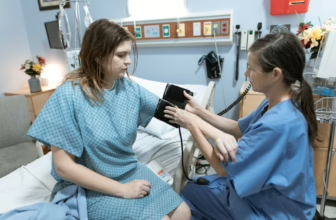According to the U.S. Bureau of Labor Statistics, the employment-population ratio for individuals with a disability increased by 3.4 percentage points to 34.8 percent in 2022. On the other hand, the employment-population ratio for individuals without a disability increased by 1.9 percentage points to 74.4 percent.
Individuals with a disability were found to be less likely to have completed a bachelor's degree or higher compared to those without a disability. Additionally, those with higher levels of education were more likely to be employed as opposed to those with lower levels of education.
For individuals with disabilities looking to change careers, pursuing a career in nursing can provide a fulfilling and rewarding path. However, traditional nursing programs can be time-consuming and require a significant investment of resources.
Fortunately, Accelerated Bachelor of Science in Nursing (ABSN) programs offer an alternative for career changers who want to quickly and efficiently transition into the nursing field. ABSN programs are designed for individuals who hold a bachelor's degree in a non-nursing field and provide a streamlined path to a nursing career.
For people with disabilities, ABSN programs can offer unique benefits and opportunities to overcome potential barriers to entering the nursing profession.
In this article, we will explore the various benefits of an ABSN program for individuals with disabilities and how these programs are making nursing education more accessible and inclusive.
The Shorter Duration of ABSN Programs
The shorter duration of ABSN programs compared to traditional nursing programs can be beneficial for individuals with disabilities who may need to enter the workforce sooner.
Moreover, students with disabilities can also pursue the online acquisition of the program. Online accelerated second-degree BSN programs can offer several benefits for people with disabilities. These programs provide a flexible and accessible approach to education that accommodates different abilities and learning styles.
Students can complete coursework from home, minimizing the need for physical travel or accommodation. Online programs also allow students to work at their own pace, enabling them to manage their studies around health needs or disabilities.
Accelerated BSN graduates have high employment rates, offering opportunities for individuals with disabilities to enter the nursing field and contribute their skills and expertise.
Institutes like Marymount University also provide clinical placement support to their students. The admission requirement for Marymount University’s online ABSN course includes a writing sample, one letter of recommendation, and transcripts with a minimum GPA of 2.8.
The Hands-on Clinical Experience Provided in ABSN Programs
Hands-on experience in the clinical setting is an invaluable aspect of an ABSN program. The hands-on experience can help students build confidence, develop skills, and establish relationships with faculty and staff members.
As a result, this can be a supportive environment for individuals with disabilities to gain valuable knowledge about nursing practice.
A Range of Career Paths and Specialties
Nursing is a broad profession with many specialties. Nurses can work in hospitals, long-term care facilities, and private practices. They can work as educators or researchers, they can specialize in pediatrics or geriatrics, and the list goes on and on.
In addition to providing direct patient care, nurses often assume leadership roles within their organizations and communities. As such, nursing offers individuals with disabilities a variety of career paths through which they may find professional satisfaction while also contributing positively to society at large.
Nursing Is a Respected and Rewarding Profession
Nursing is a highly respected and rewarding profession that can provide a sense of purpose and fulfillment for individuals with disabilities. Nurses are highly regarded by their patients, who appreciate the care they receive from nurses.
In addition to providing excellent patient care, nurses also have the opportunity to make a real difference in the lives of those they help by using their skills and knowledge.
According to a MoneyWise report, for 16 consecutive years, Gallup has recognized nurses as the most ethical practitioners. They are widely regarded as devoted, compassionate individuals who derive pleasure from their job. A career in nursing can yield a median salary of $68,450.
The Demand for Nurses Continues to Grow
Nurses are in demand, and individuals with disabilities need to understand the benefits of a nursing career. Nursing is a stable profession that can provide job security and stability for people with physical and cognitive disabilities who may face additional barriers to employment.
According to a report on Fierce Healthcare, the American Nurses Association (ANA) has announced that to fulfill job positions and replace retirees, the United States will have to generate 1.1 million fresh registered nurses by 2022. ANA statistics show that nearly one in five nurses are due to retire shortly.
To cope with the aging population, wider healthcare access following healthcare reform, and the latest value-based healthcare model, ANA has suggested that the government invest in federal funding, nurse education, and recruitment practices to guarantee that the industry satisfies demand and prioritizes quality.
The Skills and Knowledge Gained Through the Program are Transferable
The skills and knowledge gained through an ABSN program can be transferable to other healthcare fields or provide a foundation for future education and career advancement. For example, you may decide that you want to work with children who have special needs in their homes or schools. Or perhaps you'd like to specialize in pediatrics or geriatrics but don't want to pursue nursing as your main career path.
In either case, the training received in an ABSN program will help an individual with a disability in this area as well as many others.
Conclusion
We hope that this article has provided you with a better understanding of the benefits of an ABSN program for people with disabilities. The nursing profession can provide a range of career paths and specialties, which can provide opportunities for individuals with disabilities to find a niche that aligns with their skills and interests.
Nursing is also one of the most respected and rewarding professions in today's world, so there's no shortage of reasons why someone should consider pursuing this career path.
Image via Pexels
Follow me down the rabbit hole!
I'm Alice and I live with a dizzying assortment of invisible disabilities, including ADHD and fibromyalgia. I write to raise awareness and end the stigma surrounding mental and chronic illnesses of all kinds.








